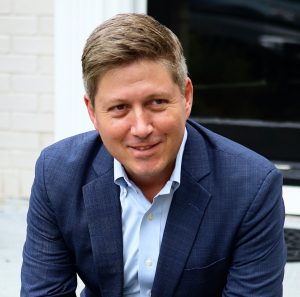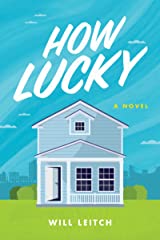

Will Leitch’s recent novel, How Lucky, is amazing. I’m not the only one who thinks so. Stephen King called it “suspenseful and often wildly funny.” Carl Hiaasen wrote, “Not many writers can shift gears from hilarious to heart-rending to harrowing, all on the same page. Will Leitch does it again and again.”
How Lucky follows Daniel, a twenty-six year old with a few close friends and a steady paycheck handling customer complaints for a regional airline. And for a few glorious days each fall, he enjoys college football tailgates near his home in Athens, Georgia, home of the University of Georgia Bulldogs. He considers himself to be a mostly lucky guy.
Daniel’s also largely housebound due to SMA, a debilitating disease he’s had since he was a small child, and that’s left him unable to speak or to move without a wheelchair. Daniel spends much of his free time observing his neighborhood from his front porch. One young woman passes by so frequently that spotting her has become part of his daily routine. Until the day he’s almost sure he sees her being kidnapped.
Daniel’s story is inspiring, no doubt. It’s also incredibly funny and insightful and thought-provoking. Daniel makes an engaging hero and his story unfolds with empathy and humor, without veering into the saccharine.
When not writing novels, Leitch writes regularly for New York, MLB.com, Medium, The New York Times and the Washington Post, often focusing on sports. In a recent New York magazine story about the Olympics, he describes how athletic feats capture our attention and awe: “To revel in human achievement, to witness accomplishments we’d never be able to dream of ourselves, to see the humanity in the extraordinary.”
Will was nice enough to take a few minutes to talk about writing, sports, crafting an unconventional hero, and the NCAA.
Can you talk about how you were able to write Daniel’s story with empathy and humor, without getting saccharine or stereotyping?
My son’s best friend has SMA, the same disease Daniel has. If I was going to write from the perspective of someone with a disease I don’t have, I’d have to do my research. I interviewed the parents of my son’s friend, who introduced me to the SMA community. They shared their views.
The ones who make stories of people with physical limitations saccharine and uplifting are almost always able-bodied. To people with SMA, it often felt infantilizing. I thought of the joke about baseball player Joe DiMaggio. When asked why he decided to retire, he replied that he’d hit a ground ball and was out at first, yet everyone applauded.
People don’t want to feel pitied. I wanted Daniel to be bighearted and empathetic. He feels good about world and wants to put good into the world. But he’s not an “up with people” type. He’s clear-eyed about his condition and the world, as well as funny and observant and wiser than he’s given credit for. SMA doesn’t define him.
The idea is that optimism is a choice and I wanted Daniel to make that choice. He decided that people are essentially good.
How did Travis, Daniel’s close friend in the book, come about?
Most people in his life know Daniel as someone with SMA. I wanted someone who knows Daniel as Daniel, and who’s a loyal friend. Travis understands Daniel’s physical limitations, but still gives him crap and doesn’t treat him differently. It wouldn’t even occur to Travis to have sympathy. He obviously worries and cares about him, but he never treats Daniel differently because, why would he?
Also, Travis is on his own journey in the story. That’s key about their relationship. Travis is still trying to figure out his life.
Travis is the friend I’d my love sons to be, with maybe a little less cursing and a healthier lifestyle.
What changed most in editing?
I hadn’t written a book in ten years. In 2017 or 2018, I had an idea that I wanted to work on this book, but I didn’t even tell my agent I was working on it. Then I asked to have dinner with him and handed him the book. Until that point, my wife was the only one who’d seen it. I didn’t even know if it made sense.
It’s been classified as a thriller and has thriller aspects, but I don’t think of it as thriller. There are a lot of conventions people expect when a book is labeled a thriller, like some plot twists. For instance, one editor asked about having Marjani (one of Daniel’s caregivers) in on the kidnapping.
Because it doesn’t fit easy categorization, How Lucky was harder to sell. We made some adjustments and sped up the pacing a bit.
But I’m glad we stuck to our guns in terms of the story itself. It would have been a betrayal of the characters to make them otherwise.
Can you talk about the role of sports, and especially football, in the story?
I wanted How Lucky to take place over one week. And, you can’t have a book set in Athens and not have a football game. To many people here, football is central to their being. Some are already talking about tailgate parties!
Also, I needed places for Daniel to go, even though he’s pretty much housebound.
Your writing often covers college sports. Any thoughts on the recent court decisions regarding athletes owning their image, and their ability to get study aids like laptops?
There’s a tradition that sports are good for kids; that it builds character. People have built a strong emotional connection to the idea that there’s something pure about college sports.
For a long time, I think it was true. When people fell in love with college football, it wasn’t the massive entertainment business it’s become. The money has just exploded. ESPN, for instance, paid $2 billion for ten games.
Twenty years ago, it probably was true that a scholarship was enough in terms of payments to the athletes. Now, when there’s so much money in sports, it’s changed the structure of football. The decisions (about athletes owning their image) are reasonable. But I also understand someone who grew up with the notion that football is pure. This upends that.
I think this transitional period will feel rough. But it will be figured out and put into a system that makes more sense.